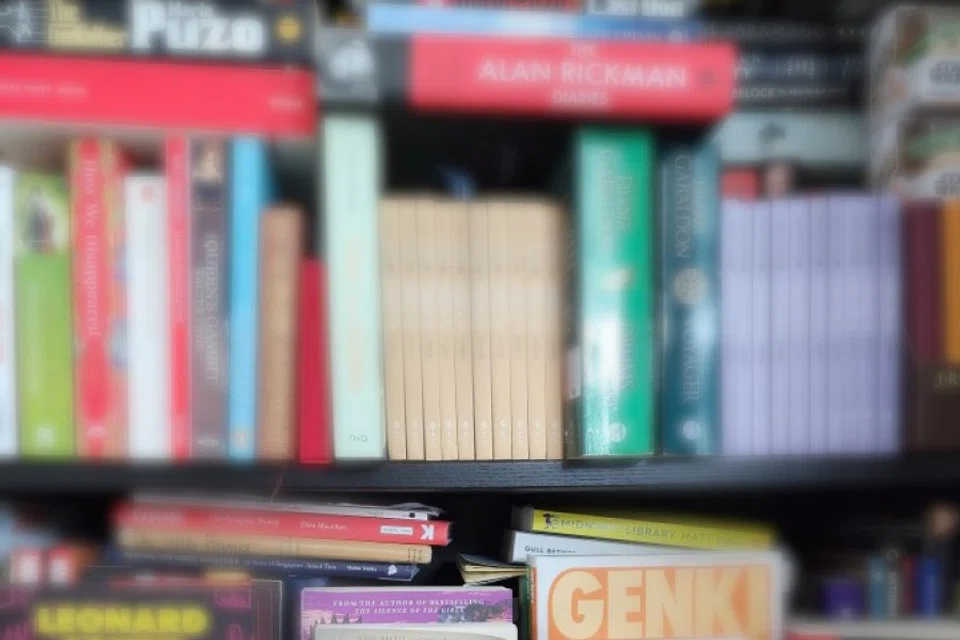When these eyes of mine can no longer read
Hua Language Centre director Chew Wee Kai ruminates on ageing and what goes on inside and out as one inevitably moves into the twilight of life, not least the obvious signs of failing eyesight. Where once it was a joy to read The Water Margin and The Romance of the Three Kingdoms, now the spirit is willing but the eyes are weak.

Over a thousand years ago, Tang dynasty essayist Han Yu wrote to his nephew Han Laocheng (known as Shi'er Lang 十二郎, lit. Twelfth Fellow): "I am not yet forty, but my eyesight is hazy, my hair is white, and my teeth are shaky."
By today's healthcare standards, it does seem a little premature for a healthy person in their thirties to experience such symptoms of ageing in the prime of life. Perhaps Han was ill; but in those days when medical care was relatively lacking, it was common for people to go to a happier place at around 40 to 50 years old - hence the saying: "It is a rare thing to see the age of 70 (人生七十古来稀)."
In my youth, I read the essay "An Account of My Late Mother" (《先妣事略》) by Ming dynasty writer Gui Youguang, where he writes of how after his mother died, his maternal grandmother died; his maternal uncle's wife and his fourth aunt later also died of an infectious illness. That paragraph contains repeated mentions of death, and ends with the words: "Thirty people died (of the infectious illness) - only my maternal grandfather and second uncle survived." After reading it, I was hit by a sense of bleak desolation.

In today's context, Han's "hazy sight" might be presbyopia or cataracts. Back then, in a time of widespread illiteracy, few people would have the "privilege" of reading by candlelight. Anyway, how many would have done what some of the ancient scholars did - make a hole in the wall to "steal" the light from a neighbour like Kuang Heng, trap fireflies in a silk pouch like Che Yin, or use the light reflected on snow like Sun Kang, just to read?
Most people would be contented to take life as it comes, rather than endure reading under the weak, flickering light of fireflies. And of course, because of that, few ancients suffered from myopia. Following the advent of Western eyeglasses in the 13th century, in today's world where myopia is so common among children and youths, that foible of the body is but a trivial issue.
But heaven always keeps a few tricks up its sleeves - only when life goes downhill does one get to savour the torments of failing eyesight, blurry vision and cataracts as applied equally to all life, regardless of status.
After one's eyesight goes, going about the hustle and bustle of everyday life, surrounded by the colourful, dizzying world, one's eyes fail to focus - everything is a blur and makes no sense...
The windows to an old soul
In one's forties, one is no longer obsessed with the narcissistic view of the eyes being windows to the soul, and no longer misses those days when the eyes of beauties shimmer like the cold waters of spring. The past is gone like a wisp of smoke.
When one is young, it is easy to spot one's other half in the madding crowd. The eagle eyes that once surveyed the earth are now dull; no more encounters of the sort where "I singled you out among the crowd". After one's eyesight goes, going about the hustle and bustle of everyday life, surrounded by the colourful, dizzying world, one's eyes fail to focus - everything is a blur and makes no sense, and a sense of panic wells up that one never felt in one's youth.

When the elderly chat about their twilight years, there are always embarrassing anecdotes of mistaking ginger slices for pork slices, or Western-style bread buns for Asian bean paste pastries. If they forget their glasses when they go out, when they get to the shelves at the bookstore or library, the book titles are a blurry jumble and they cannot do anything about it except leave in vexation and disappointment. And without the aid of their glasses, when they are standing at a hawker centre stall, all they see is a colourful mess of hazy images, while the tiny text is only targeted at youthful eyes, which immediately kills the appetite.
The heart is willing but the eyes are weak
When it comes to reading in old age, the energy with which one used to devour classics like The Water Margin and The Romance of the Three Kingdoms is no more, as one goes from never tiring of reading the same thing a thousand times, to falling asleep after reading just three lines. The eyesight is failing, dear reader; not that one does not want to, but one truly cannot.
As one ages, one grows further from reading. The heart is willing but the eyes are weak, as if these aged eyes have seen all they want of this world; all desires quietly fade, and one no longer has the great ambition of reading tens of thousands of books and travelling all over the world.
My mother used to laugh at herself: "I used to watch TV. Now, the TV watches me." Just like that, this line now applies to me.
While the desire to read has abated, it does have a new function: hypnosis. After the eyelids droop, the elderly can no longer spend several sleepless nights binge reading a novel, as they did in their youth. The dense expanse of words fills the eye with charmless waves of text, and even TV shows that are supposed to be more engaging cannot keep the eyes alive. My mother used to laugh at herself: "I used to watch TV. Now, the TV watches me." Just like that, this line now applies to me.

While good-looking young people continue to shine, one begins a lonely journey of decline. First, one suddenly finds that the eyes are rheumy, which the doctor says is due to dryness. From then on, eye drops are a daily application. And it is annoying when the ache and dryness hits; when one is talking to people, the tears start flowing unabated, and one has to keep wiping the eyes, giving the wrong impression that one is dealing with endless sorrows.
A journey of emotions
Another trick that age plays on the windows to the soul is eye bags. I never noticed them until some elderly around me started comparing who had them and who did not, and whose were deep and whose were not - that was when I realised that eyebags were also an issue of significant concern to the elderly.
Eyebags can be subtle or obvious; some eyebags are as big as the "eye bubbles" on expensive goldfish, spoiling one's looks as the bane of the elderly who still want to look good, with all sorts of methods to get rid of them. Those who feel the eyebags as a spike in their back would burn money to remove them, while the stoics see them as a common destiny. Eyebags and drooping eyelids compete in the ugliness polls - protruding and sagging, fighting to highlight one's ageing looks.

Failing eyesight leads to the elderly choosing to give in to life, closing an eye to everything and selectively not seeing things, just to save themselves a lot of trouble. The Chinese saying goes that one's vision can be as tiny as a bean; but when one hits the twilight years, this olive-sized organ of vision becomes "huge" enough to accommodate presbyopia, dryness, droopy lids, cataracts, sensitivity to light, loss of focus, weak vision - all sorts of troublesome symptoms that spoil the quality of life for the elderly. Heaven is really mean.
As one ages, the blood vessels narrow while the tear ducts "flourish". The trivialities of life, or the shallow, stereotypical tear-jerking scenes on screen can easily bring on the tears. When one is old, one's resistance drops, and all the tears that one fought down with a firm brow and cold eye in one's youth are paid back twofold.





![[Photos] Fact versus fiction: The portrayal of WWII anti-Japanese martyrs in Taiwan](https://cassette.sphdigital.com.sg/image/thinkchina/3494f8bd481870f7c65b881fd21a3fd733f573f23232376e39c532a2c7593cbc)